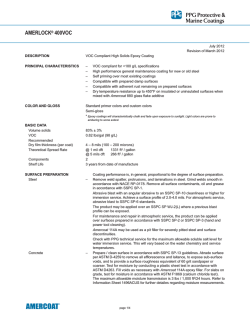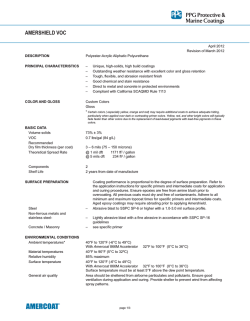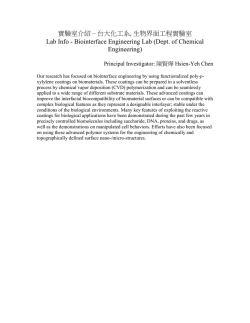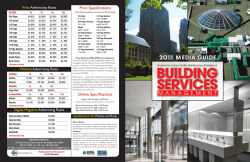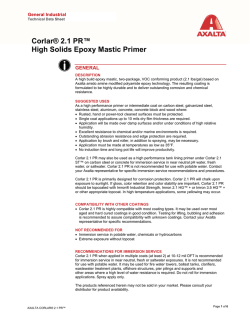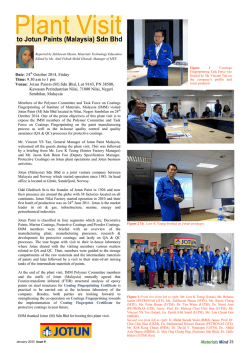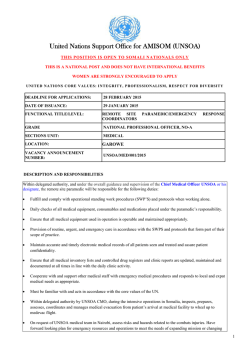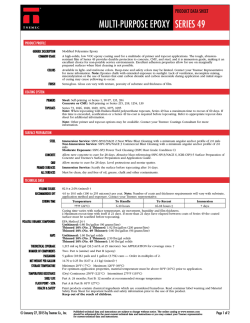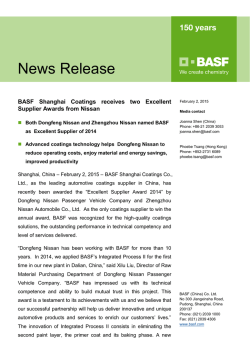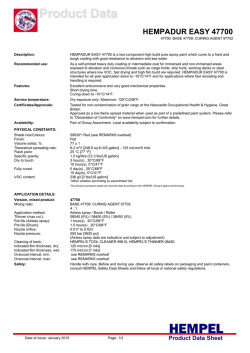
Amerlock 2 VOC - Pacific Southwest Coatings
AMERLOCK® 2VOC July 2012 Revision of April 2012 DESCRIPTION Fast Dry, High Solids Epoxy Coating PRINCIPAL CHARACTERISTICS – – – – – – – COLOR AND GLOSS* Standard primer colors and custom colors Semi-gloss * Epoxy coatings will chalk and fade with exposure to sunlight. Light colors are prone to ambering to some BASIC DATA Volume solids VOC Recommended Dry film thickness (per coat) Theoretical Spread Rate Components Shelf Life SURFACE PREPARATION Steel Concrete Fast dry, dry to recoat in 3 hours at 70°F (21°C) VOC compliant for <100 g/L specifications High performance general maintenance coating for new or old steel Self priming over most existing coatings Compatible with prepared damp surfaces Compatible with adherent rust remaining on prepared surfaces Dry temperature resistance up to 450°F on insulated or uninsulated surfaces when mixed with Amercoat 880 glass flake additive extent. Note that product tinted to custom colors are not recommended for immersion service. Only use factory grind batches for immersion. 83% ± 3% 0.7 lbs/gal (84 g/L) 4 – 8 mils per coat (100 – 200 microns) @ 1 mil dft 1331 ft2 / gallon @ 5 mils dft 266 ft2 / gallon 2 3 years from date of manufacture – – Coating performance is, in general, proportional to the degree of surface preparation. Remove weld spatter, protrusions, and laminations in steel. Grind welds smooth in accordance with NACE RP-0178. Remove all surface contaminants, oil and grease in accordance with SSPC SP-1. Abrasive blast with an angular abrasive to a SSPC SP-10 cleanliness or higher for immersion service. Achieve a surface profile of 2.04.0 mils. For atmospheric service, abrasive blast to SSPC SP-6 standards. The product may be applied over a SSPC SP WJ-2(L) where a previous blast profile can be exposed. For maintenance and repair in atmospheric service, the product can be applied over surfaces prepared in accordance with SSPC SP-2 or SSPC SP-3 (hand and power tool cleaning). Amercoat 114A may be used as a pit filler for severely pitted steel and surface discontinuities. Check with PPG technical service for the maximum allowable soluble salt level for water immersion service. This will vary based on the water chemistry and service temperatures. Prepare / clean surface in accordance with SSPC SP-13 guidelines. Abrade surface per ASTM D-4259 to remove all efflorescence and laitance, to expose sub-surface voids, and to provide a surface roughness equivalent of 60 grit sandpaper or coarser. Test for moisture by conducting a plastic sheet test in accordance with ASTM D4263. Fill voids as necessary with Amercoat 114A epoxy filler. For slabs on grade, test for moisture in accordance with ASTM F1869 (calcium chloride test). The maximum allowable moisture transmission is 3 lbs / 1,000 ft2/24 hours. Refer to Information Sheet 1496ACUS for further details regarding moisture measurements. page 1/4 AMERLOCK 2VOC Galvanized Steel – Non-Ferrous Metals and Stainless Steel – Aged Coatings and Repairs – Repair – ENVIRONMENTAL CONDITIONS Ambient temperatures Material temperatures Relative humidity Surface temperature General air quality INSTRUCTIONS FOR USE Mixing ratio by volume Pot life Induction time Airless spray Air spray Brush & roll Remove oil or soap film with detergent or emulsion cleaner. Lightly abrasive blast with a fine abrasive in accordance with SSPC SP-16 guidelines to achieve a profile of 1.5-3.0 mils. When light abrasive blasting is not possible, galvanizing can be treated with a suitable zinc phosphate conversion coating. Galvanizing that has at least 12 months of exterior weathering and has a rough surface with white rust present may be over-coated after power washing and cleaning to remove white rust and other contaminants. The surface must have a measurable profile. A test patch is recommended to confirm adhesion. Not recommended over chromate sealed galvanizing without blasting to thoroughly remove chromates. Adhesion problems may occur. Abrasive blast in accordance with SSPC SP-16 guidelines to achieve a uniform and dense 1.5-4.0 mil anchor profile. Size and hardness of abrasive should be adjusted as necessary based on the hardness of the substrate. Aluminum may be treated with a surface treatment compliant with Mil-DTL-5541 or equivalent (non-immersion applications only). All surfaces must be clean, dry, tightly bonded and free of all loose paint, corrosion products or chalky residue. Abrade surface, or clean with Prep 88. Amerlock 2VOC is compatible over most types of properly applied and tightly adhering coatings, however, a test patch is recommended to confirm compatibility. Ensure the coating system is sound and well adhered. Do not apply over acrylic coatings or coatings that exhibit poor solvent resistance. A test patch is recommended. Sweep blast or otherwise thoroughly abrade the existing coating in accordance with SSPC SP-7. Alternately, Prep 88 may be used to prepare some existing coatings. Please refer to Prep 88 data sheet for details. Feather the edges of tightly adhered, in-tact coatings at the perimeter of repair areas. Power tool clean the existing steel in accordance with SSPC SP-3 (atmospheric service) or SSPC SP-11 (immersion service). 20°F to 122°F (-6°C to 50°C) 40°F to 90°F (5°C to 32ºC) 0-100%, surface must be free of visible moisture. For immersion service and for optimum performance, surface temperature must be at least 5°F above the dew point temperature. 20°F to 122°F (-6°C to 50°C) Area should be sheltered from airborne particulates and pollutants. Avoid combustion gases or other sources of carbon dioxide that may promote amine blush and ambering of light colors. Ensure good ventilation during application and curing. Provide shelter to prevent wind from affecting spray patterns. 1 parts base to 1 part hardener Pre-mix pigmented components with a pneumatic air mixer at moderate speeds to homogenize the container. Add hardener to base and agitate with a power mixer for 1-2 minutes until completely dispersed. 50°F 2VOC 2 hours 70°F 1 hour 90°F 0.5 – 0.75 hour None required 45:1 pump or larger, 0.017-0.019 fluid tip Can be sprayed with plural component application equipment. Thin up to 20%, standard conventional equipment, 0.070" fluid orifice Use a high quality natural bristle brush and / or solvent resistant, 3/8" nap roller. Ensure brush / roller is well loaded to avoid air entrainment. Multiple coats may be necessary to achieve adequate film build. page 2/4 AMERLOCK 2VOC Thinner Cleaning solvent Primers Topcoats Safety precautions DRY/CURE TIMES PPG 97-739 and tert-butyl acetate are VOC exempt thinners which can be used without limit to maintain < 100 g/L. The following thinners may be used up to 2.5 oz. per gallon to maintain a VOC of < 100 g/L. Amercoat 65 (xylene), Amercoat 101 (recommended for > 90°F), Amercoat 8 (to extend pot life 10-20%) Amercoat 12 Cleaner or Amercoat 65 thinner (xylene) Direct to substrate; Dimetcote- Series Primers, Amercoat 68HS, Amercoat 68MCZ Amercoat 450-Series Polyurethanes, Amershield VOC, PSX 700, PSX One For paint and recommended thinners see safety sheet 1430, 1431 and relevant material safety data sheets This is a solvent borne paint and care should be taken to avoid inhalation of spray mist or vapor as well as contact between the wet paint and exposed skin or eyes. Amerlock 2VOC @ 5 mils dft 32°F Dry to touch 24 hours Dry to recoat/ topcoat 24 hours Dry through Max recoat, self Max topcoat, urethanes, PSX Cure to immersion * PRODUCT QUALIFICATIONS – – – AVAILABILITY Packaging Product codes factory colors only 50°F 8 hours 70°F 2 hours 38 hours 13 hours 4.5 hours 90 days 60 days 30 days 21 days 7 days 3 days 30 days 6 hours 14 days 90°F 1 hour 2 hours 3 hours 1.5 hours 7 days 4 days 14 days 2 days Dry times are dependent on air and surface temperatures as well as film thickness, ventilation, and relative humidity. Maximum recoating time is highly dependent upon actual surface temperatures – not simply air temperatures. Surface temperatures should be monitored, especially with sun-exposed or otherwise heated surfaces. Higher surface temperatures shorten the maximum recoat window.surfaces. Higher surface temperatures shorten the maximum recoat window. Surface must be clean and dry. Any contamination must be identified and removed. A detergent wash with Prep 88 or equivalent is required prior to application of topcoats after 30 days of exposure. However, particular attention must be paid to surfaces exposed to sunlight where chalking may be present. In those situations, a further degree of cleaning may be required. PPG Technical Service can advise on suitable cleaning methods. If maximum recoat/topcoat time is exceeded, then roughen surface. Compliant with USDA Incidental Food Contact Requirements AWWA D102-06 ICS #1, #2, #3, #5 LEED’s compliant for Anti-corrosive Paint category Available in 2-gallon and 5-gallon kits 2-gallon kits have 1 full gallon of base and 1 full gallon of hardener 5 gallon kits have 2.5 gallons of base and 2.5 gallons of hardener AK2V-1 AK2V-3 AK2V-9 AK2V-23 AK2V-72 AK2V-81 Buff base component White base component Black base component Pearl Gray base component Oxide Red base component Safety Yellow base component page 3/4 AMERLOCK 2VOC AK2V-T1 AK2V-T2 AK2V-T3 AK2V-T5 AK2V-B Worldwide statement Deep Tint base component Light Tint base component Neutral Tint base component High Hiding Yellow base component Hardener component While it is always the aim of PPG Protective & Marine Coatings to supply the same product on a worldwide basis, slight modification of the product is sometimes necessary to comply with local or national rules/circumstances. Under these circumstances an alternative product data sheet is used. WARRANTY STATEMENT PPG warrants (i) its title to the products, (ii) that the quality of the product(s) conform to PPG’s specifications for such products in effect at the time of manufacture and (iii) that the products shall be delivered free of the rightful claim of any third person for infringement of any U.S. patent covering the products. THESE ARE THE ONLY WARRANTIES PPG MAKES AND ALL OTHER EXPRESS OR IMPLIED WARRANTIES, UNDER STATUTE OR ARISING OTHERWISE IN LAW, FROM A COURSE OF DEALING OR USAGE OF TRADE, INCLUDING WITHOUT LIMITATION, ANY OTHER WARRANTY OF FITNESS FOR A PARTICULAR PURPOSE OR USE, ARE DISCLAIMED BY PPG. The information in this data sheet is based upon laboratory tests PPG believes to be accurate and is intended for guidance only. PPG may modify the information contained herein at any time as a result of practical experience and continuous product development. All recommendations or suggestions relating to the use of PPG products, whether in technical documentation, or in response to a specific inquiry, or otherwise, are based on data, which to the best of PPG’s knowledge, are reliable. The products and information are designed for users having the requisite knowledge and industrial skills and it is the end-user’s responsibility to determine the suitability of the product for its intended use. PPG has no control over either the quality or condition of the substrate, or the many factors affecting the use and application of the product. Therefore, PPG does not accept any liability arising from loss, injury or damage resulting from such use or the contents of this data sheet (unless there are written agreements stating otherwise). This data sheet supersedes all previous versions and it is the user’s responsibility to ensure that this data sheet is current prior to using the product. The English text of this document shall prevail over any translation thereof. LIMITATION OF LIABILITY The information in this data sheet is based upon laboratory tests we believe to be accurate and is intended for guidance only. All recommendations or suggestions relating to the use of the products made by PPG Protective & Marine Coatings, whether in technical documentation, or in response to a specific enquiry, or otherwise, are based on data which to the best of our knowledge are reliable. The products and information are designed for users having the requisite knowledge and industrial skills and it is the end-user’s responsibility to determine the suitability of the product for its intended use. PPG Protective & Marine Coatings has no control over either the quality or condition of the substrate, or the many factors affecting the use and application of the product. PPG Protective & Marine Coatings does therefore not accept any liability arising from loss, injury or damage resulting from such use or the contents of this data sheet (unless there are written stating otherwise). The data contained herein are liable to modification as a result of practical experience and continuous product development. This data sheet replaces and annuls all previous issues and it is therefore the user’s responsibility to ensure that this sheet is current prior to using the product. The current data sheets are maintained at www.ppgpmc.com The English text of this document shall prevail over any translation thereof. page 4/4
© Copyright 2026
